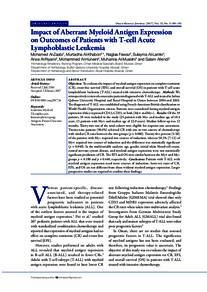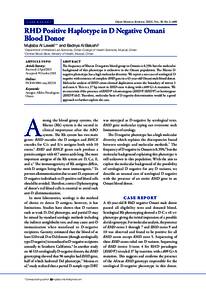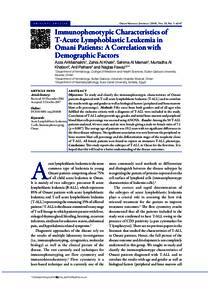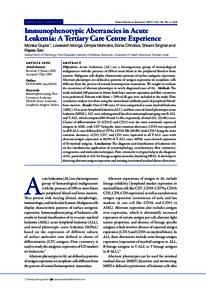Document
Impact of aberrant myeloid antigen expression on outcomes of patients with T-cell acute lymphoblastic leukemia.
Identifier
DOI 10.5001/omj.2017.36
Contributors
Al-Khabori, Murtadha., Author
Fawaz, Naglaa., Author
Al-Lamkiyah, Sulayma., Author
Al-Riyamiyah, Arwa Z., Author
Al-Huneini, Mohammed., Author
Al-Muslahi, Muhanna., Author
Al-Kindi, Salam., Author
Publisher
Oman Medical Specialty Board.
Gregorian
2017-05
Language
English
English abstract
Objectives: To evaluate the impact of myeloid antigen expression on complete remission (CR), event-free survival (EFS), and overall survival (OS) in patients with T-cell acute lymphoblastic leukemia (T-ALL) treated with intensive chemotherapy. Methods: We retrospectively reviewed consecutive patients diagnosed with T-ALL and treated in Sultan Qaboos University Hospital and Royal Hospital in Oman between 2004 and 2010. The diagnosis of T-ALL was established using French-American-British classification or World Health Organization criteria. Patients were considered having myeloid antigen expression if they expressed CD13, CD33, or both (My+ and My–). Results: Of the 39 patients, 38 were included in the study (25 patients with My– and median age of 18.4 years, 13 patients with My+ and median age of 22.0 years). Median follow-up was 12 months. Thirty-two out of the total cohort were eligible for response-rate assessment. Twenty-nine patients (90.6%) achieved CR with one or two courses of chemotherapy with similar CR rates between the two groups (p = 0.880). Twenty-five percent (5/20) of the patients with My– required two courses of induction, whereas 58.3% (7/12) of My+ required two courses of induction and the difference was statistically significant (p = 0.040). In the multivariable analysis; age, gender, initial white blood cell count, central nervous system disease, and myeloid antigen expression were not statistically significant predictors of CR. The EFS and OS were similar between the My+ and My– groups p = 0.180 and p = 0.440, respectively. Conclusions: Patients with T-ALL with myeloid antigen expression need more courses of induction; however, rates of CR, EFS, and OS are not different from those without myeloid antigen expression. Larger prospective studies are required to confirm these findings.
Member of
Resource URL
Category
Journal articles




